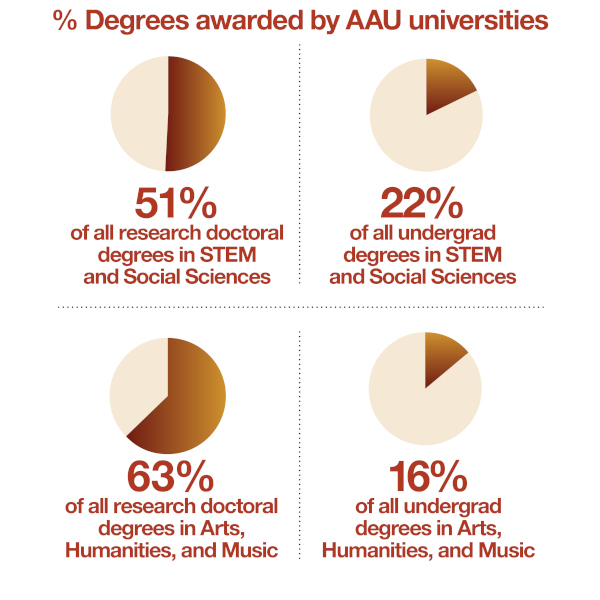 House Bill Threatens Ability of Some Students to Take Out Federal Loans
House Bill Threatens Ability of Some Students to Take Out Federal Loans
Last week, the House Education and Workforce Committee voted 37-8 to move the Bipartisan Workforce Pell Act (H.R. 6585) out of committee and to bring it to the House floor for a vote. The bill allows students to use Pell Grants to participate in short-term workforce development training programs, but it does so by banning students at some private colleges from taking out federal student loans.
According to a House Education Committee press release, “The legislation provides opportunities for students and workers looking to gain skills in high-demand fields by allowing Pell Grants to support students enrolled in high-quality, short-term workforce programs that will lead to career advancement.” While enabling students to use Pell Grants for short-term workforce development programs is a good thing, the bill offsets the cost of funding these grants by banning undergraduate and graduate students who attend institutions subject to the endowment tax from taking out federal student loans.
The Atlantic reported last week that, “according to the National Association for Independent Colleges and Universities, approximately 64,000 students stand to lose $1.8 billion in student loan aid if the bill passes in its current form.” AAU anticipates that the bill would directly impact undergraduate and graduate students at approximately 60 institutions (including several non-AAU members). As The Atlantic noted, while many of these institutions already cover the costs of education for low-income students, “many middle-class students would be forced to take out private loans, which can have astronomical interest rates.” The bill would also negatively affect students in graduate and professional programs, including nursing and healthcare programs, who rely on federal loans to access their education. At Duke University, for example, The Atlantic reported that 3,400 students, including 700 students from the nursing school, would lose access to loans.
Last week, AAU joined five other higher education associations in sending a letter to the leaders of the House Education and Workforce Committee expressing concerns about the funding offset. The letter noted that the bill would upend the current approach of the federal financial aid system that “has always relied on the basic concept of students choosing the right institution for them and then receiving aid based on their individual circumstances.” Instead, the letter argued, the bill would create a new system “where Congress selects winners and losers, limiting individual choice, especially for low-income students.” The letter expressed concerns that the bill would set a dangerous precedent that would allow other institutions to be “targeted in the future using the same approach because of their mission, governing structure, or other characteristics.” AAU will monitor the bill as it heads to the House floor.
Congress Passes FY24 NDAA; House Leaves Without Deal on FY24 Appropriations
Last week, both chambers of Congress voted to send the FY24 National Defense Authorization Act to President Biden’s desk for his signature. The bill authorizes $886.3 billion in defense spending, including $841.4 billion for the Department of Defense and $32.4 billion for the Department of Energy. It also authorizes $145.9 billion in research and development investments across the national security enterprise. A summary of the bill from the Senate Armed Services Committee is available here.
The House, however, recessed for the holidays without a deal on the topline spending figures for the FY24 appropriations bills. The lack of a deal leaves lawmakers with very little time before the January 19 deadline to pass the FY24 Agriculture-FDA, Energy-Water, Military Construction-VA, and Transportation-HUD bills.
 AAU Universities Partner with IBM, Meta to Launch New AI Alliance
AAU Universities Partner with IBM, Meta to Launch New AI Alliance
Earlier this month, multiple AAU member universities (including Dartmouth College; the University of California, Berkeley; the University of Notre Dame; New York University; the University of Texas at Austin; the University of Illinois Urbana-Champaign; and Yale University) joined with other partners in government and the industry, including IBM and Meta, to launch the AI Alliance to accelerate responsible innovation in artificial intelligence technology.
The AI Alliance brings together a community of international researchers, developers, and organizational leaders to address safety and ethics concerns regarding AI and to develop AI solutions that benefit society. “Innovations in artificial intelligence offer, at the same time, the promise of serving the common good and the threat of undermining it. It is critical that we engage serious ethical questions about AI alongside the technological,” said University of Notre Dame President Rev. John I. Jenkins. According to a press release by the Yale School of Engineering and Applied Science, “By bringing together leading developers, scientists, academic institutions, companies and other innovators, the AI Alliance will pool resources and knowledge to address safety concerns while providing a platform for sharing and developing solutions that fit the needs of researchers, developers, and adopters around the world.”
New Biden Administration Proposal for Exercising March-in Rights Threatens Innovation and University Public-Private Partnerships
Last Thursday, the Biden administration announced new actions intended to help lower the costs of prescription drugs. The actions included the release of a “Draft Interagency Guidance Framework for Considering the Exercise of March-in Rights” by the National Institute of Standards and Technology to “help agencies evaluate when it might be appropriate to require licensing of a patent developed with federal funding.”
The 1980 Bayh-Dole Act allows recipients of federal funding to own patent rights and encourages universities and researchers to partner with the private sector to bring new discoveries to the market. It also grants federal agencies a limited right to “march in” and to require owners of a patent developed through federally funded research to grant additional patent licenses to others. Congress approved this provision of the so-called “march-in” rights to address concerns that companies would license university inventions solely to prevent their development and entry into the marketplace. With the new framework, the Biden administration is proposing to add price as a criterion agencies can use to “march in” and to seize patents for drugs or individual products that are deemed too expensive.
Although the Biden administration has touted its efforts as part of a plan to lower drug prices, the proposed framework would apply to all areas of university research. According to Joseph P. Allen, executive director of the Bayh-Dole Coalition, the proposed framework “would discourage critical public-private partnerships and prevent thousands of transformational discoveries from reaching consumers.” He continued: “Unfortunately, the guidelines open up other subjective criteria which undermine confidence that public sector research institutions can be reliable partners. That uncertainty puts our innovation system at risk just as we need it most.”
AAU will work with our partner associations to submit comments on the framework.
 AAU, Associations Urge State Department to Extend Visa Processing Flexibilities
AAU, Associations Urge State Department to Extend Visa Processing Flexibilities
Earlier this month, AAU joined 25 other higher education associations in sending a letter urging the State Department to “extend or make permanent the current authorities to waive the in-person interview requirement for certain nonimmigrant visa applicants,” including international students and scholars applying for F-1 and J-1 visas.
The waiver, established during the COVID-19 pandemic, applies only to applicants who meet certain conditions. The letter noted the waiver’s role in helping the State Department issue the highest number of visas since FY16 last year and argued that it is “in the national interest of the United States” to continue offering waivers permanently. As evidence, it pointed to data from NAFSA: Association of International Educators, which found that the growth in international student enrollment during the 2022-23 academic year contributed more than $40.1 billion to the U.S. economy and created more than 363,000 jobs. “Retaining the visa interview waiver, which only applies to a certain population, helps all international students and scholars by allowing the faster processing of visas overall while maintaining national security,” the letter argued.
 LRUR Going on Holiday Hiatus, Will Return in the New Year
LRUR Going on Holiday Hiatus, Will Return in the New Year
The Leading Research Universities Report will take a break from publication for the remainder of the holiday season. We will return in 2024 on Monday, January 8. Happy holidays!
News of Interest
Politico: Security and Academic Officials Pitch Federal Action to Quell “Heightened Tension” on Campuses – A subcommittee of the Homeland Security Academic Partnership Council including AAU President Barbara R. Snyder recently released “urgent recommendations for an expansive federal response to campus threats, free speech debates and hateful acts” on U.S. college campuses in the wake of the Israel-Hamas war. The recommendations include “requests for a White House campus safety convening aimed at turning down the heat, new forms of information sharing and even modified immigration enforcement actions for Israel and Palestinian territories,” according to Politico.
KAGS: Interim Texas A&M President Mark Welsh Named 27th President of University – Last week, the Texas A&M board of regents confirmed retired Gen. Mark Welsh III as the university’s next president. Welsh has served as the university’s interim president since July. He was previously dean of the university’s Bush School of Government and Public Service.
CNN: UPenn Names J. Larry Jameson as Its Interim President, Replacing Liz Magill – The University of Pennsylvania’s board of trustees announced last week that it has appointed J. Larry Jameson, dean of the university’s medical school, as the university’s interim president following Elizabeth Magill’s resignation earlier this month. Jameson will remain in the role until the board names a permanent president.
USA Today: How Many Colleges Consider Legacy Admissions? Maybe More Than You Think – According to new data released by the National Center for Education Sciences, 579 colleges and universities across the United States “consider whether applicants’ parents, siblings or other relatives attended the institution to which they are applying” for admissions. The nearly 600 schools that consider legacy admissions comprise “about a third of the more than 1,900 schools in the survey with so-called competitive admissions.”
The Washington Post: U-Va. To Cover Tuition, Fees for Virginia Families Making $100K or Less – The University of Virginia is expanding its AccessUVA program to “cover all tuition and fees for families who make $100,000 or less in an effort to increase access to the state’s flagship university and account for inflation.” UVA President Jim Ryan “said the goal of the expansion is to increase access to more families.”
Fobes: 10 of 2023’s Biggest Higher Education Stories – Some of the biggest news stories in higher education this year included the Supreme Court’s decision to end the practice of race-conscious admissions, an upward tick in college enrollment, and presidential transitions.
Featured Research

AI May Spare Breast Cancer Patients Unnecessary Treatments
Northwestern Medicine has developed a new artificial intelligence tool that “may make it possible to spare breast cancer patients unnecessary chemotherapy treatments by using a more precise method of predicting their outcomes.”

New Fishing Technology ‘Lighting the Way’ to Sustainable Future
Arizona State University Professor Jesse Senko recently won the U.S. Fish and Wildlife Service’s Theodore Roosevelt Genius Prize for creating a solar-powered buoy that reduces “bycatch of endangered sea turtles, sharks and marine mammals while maintaining target fish catch.”
Stat of the Week

AAU universities awarded the majority of all research doctoral degrees in STEM and social sciences (51%) as well as in the arts, humanities, and music (63%) granted in the United States in 2021. Our members also awarded 22% of all U.S. undergraduate degrees in STEM and social sciences and 16% of all undergraduate degrees in the arts, humanities, and music in 2021. To learn more about the economic and educational impact of AAU universities, visit AAU By the Numbers.